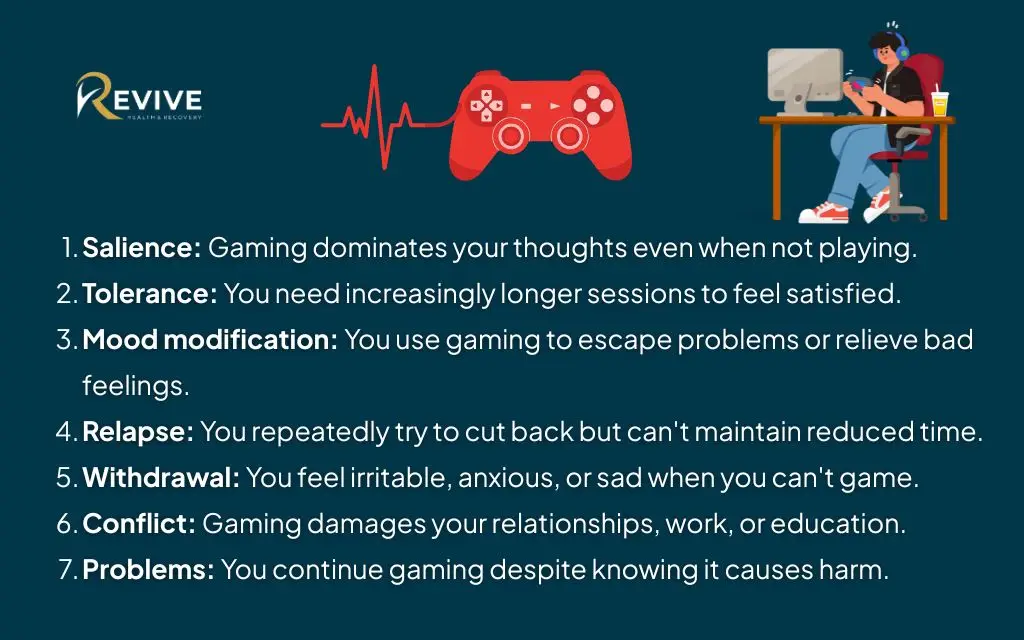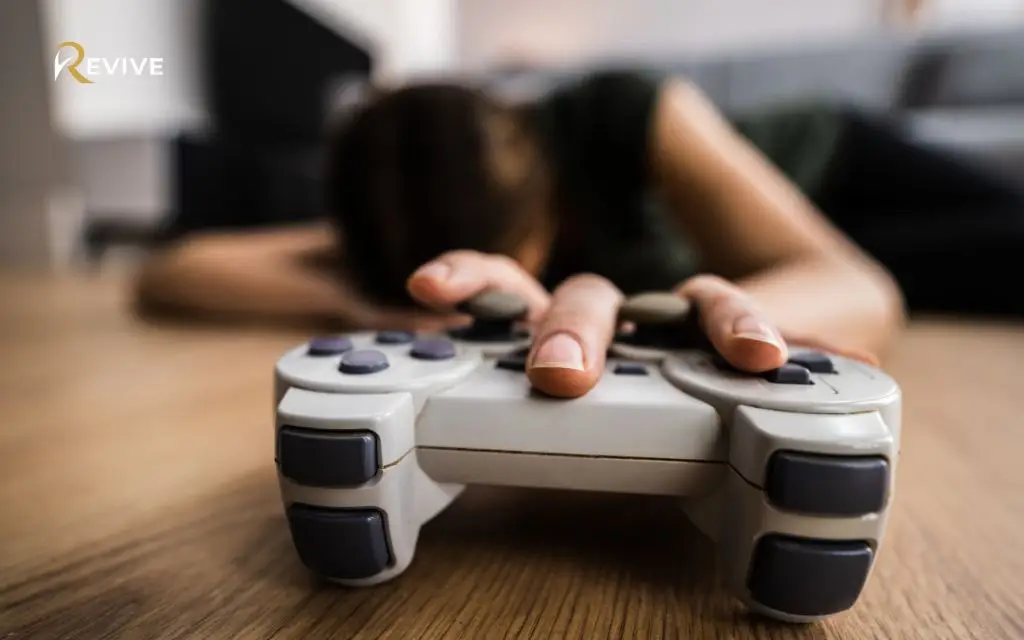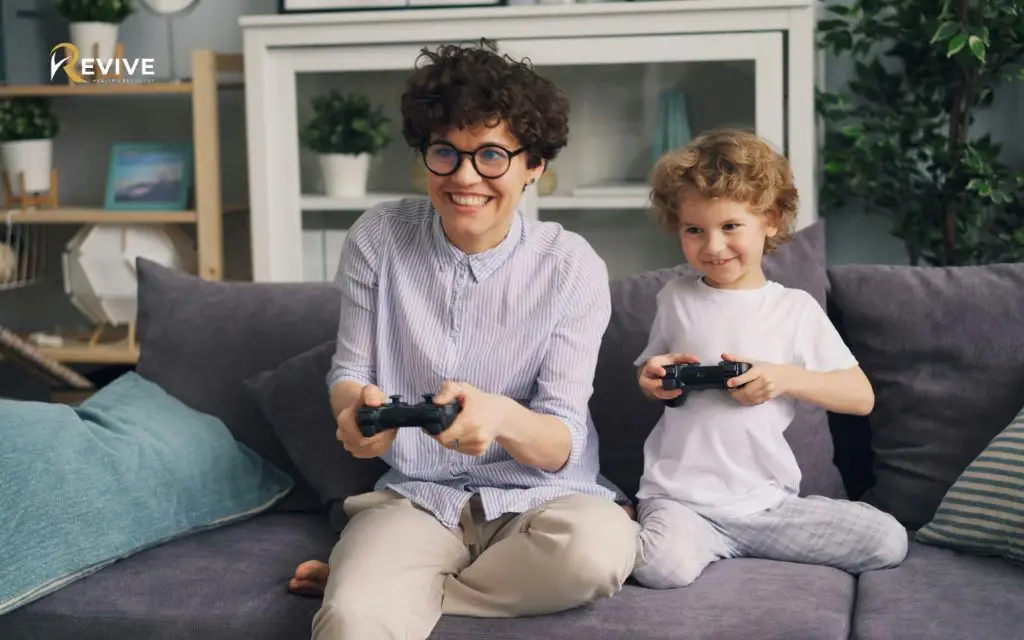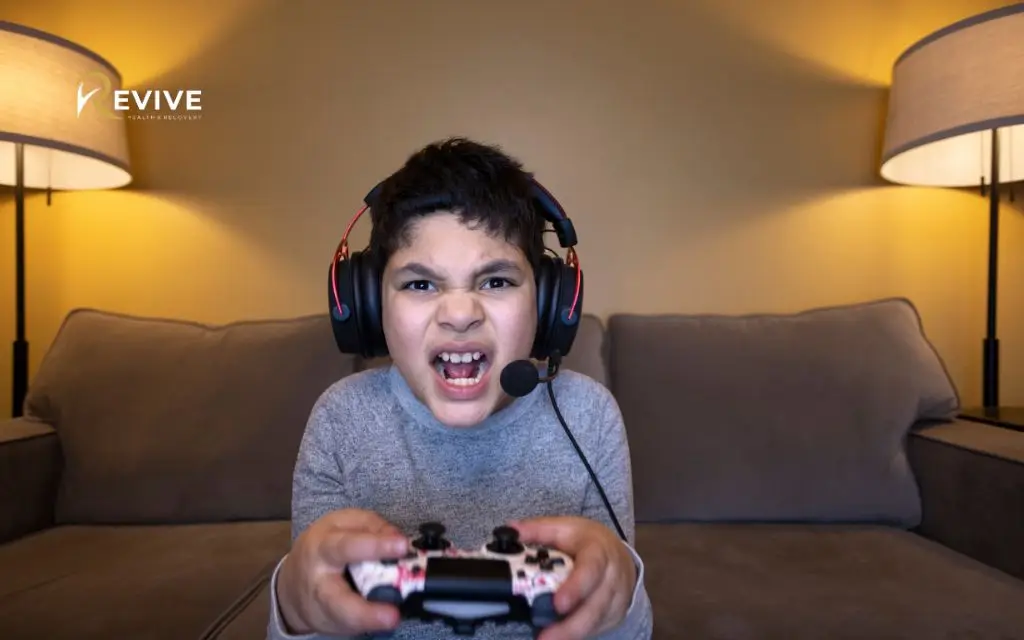Does gaming control your life instead of you controlling your gaming? Over 60 million people worldwide struggle with Internet Gaming Disorder, now officially recognized by the World Health Organization. In Denver, more residents are seeking help for compulsive gaming that damages work, relationships, and mental health.
Here’s what matters: overcoming gaming addiction is possible. Research shows 55.4% of people with gaming disorder face dual diagnosis conditions like depression and social isolation. This creates a cycle where you game to escape difficult feelings, which increases isolation, which fuels more gaming.
This guide covers proven strategies for overcoming video game dependence: evidence-based therapies, screen time reduction techniques, and family-centered approaches. Whether you’re concerned about your own habits or a loved one’s behavior, Denver offers excellent outpatient treatment options. Recovery starts with understanding the problem and taking that first step.
Understanding gaming addiction in the digital age
What makes gaming addictive?

Gaming disorder became the first behavioral addiction officially recognized by WHO in the ICD-11. Games hijack your brain’s reward system through dopamine releases, similar to substance addictions. Game designers build in progression systems, random rewards, and social elements that keep you hooked.
Seven core criteria define gaming disorder:
- Salience: Gaming dominates your thoughts even when not playing.
- Tolerance: You need increasingly longer sessions to feel satisfied.
- Mood modification: You use gaming to escape problems or relieve bad feelings.
- Relapse: You repeatedly try to cut back but can’t maintain reduced time.
- Withdrawal: You feel irritable, anxious, or sad when you can’t game.
- Conflict: Gaming damages your relationships, work, or education.
- Problems: You continue gaming despite knowing it causes harm.
Gaming addiction vs. heavy gaming
Heavy gaming means you play frequently but maintain balance. You work, maintain relationships, handle responsibilities, and can stop when needed. Gaming disorder means you’ve lost control, and it’s causing real problems.
The DSM-5-TR provides clinical diagnostic criteria. Ask yourself: Do you neglect duties to game? Has performance declined? Have relationships suffered? Do you feel unable to reduce gaming despite wanting to? Have you lied about gaming habits?
If you answered yes to five or more questions and the pattern persists for 12 months, professional assessment makes sense. Don’t wait if gaming causes significant problems now.
Key self-assessment indicators include time distortion, priority inversion (gaming takes precedence over valued activities), preoccupation interference, failed moderation attempts, and escape motivation.
The dual diagnosis challenge: gaming, depression and social isolation
The vicious cycle explained
Gaming disorder rarely occurs alone. Research shows 55.4% of people with gaming disorder have co-occurring mental health conditions. Depression and social anxiety create a self-perpetuating cycle that makes overcoming gaming addiction particularly challenging.
The cycle works like this: You feel depressed or anxious. Real-world interactions feel overwhelming. Gaming provides immediate relief through achievement without risk, social connection without vulnerability, and control over your environment.
The problem? This relief is temporary and worsens underlying conditions. Gaming reduces face-to-face contact, increasing isolation. You neglect responsibilities, triggering more guilt. Real-world skills atrophy, making non-gaming activities even harder.
Research shows a 10% variance correlation between gaming disorder and depression, 6% with social anxiety. The causation runs both ways: depression drives gaming behavior, and excessive gaming worsens depression.

Co-occurring mental health conditions
- ADHD (38% prevalence): Gaming provides constant stimulation that appeals to ADHD brains. However, gaming worsens ADHD symptoms over time by raising your baseline need for excitement.
- Anxiety disorders (29% prevalence): Gaming offers temporary anxiety relief through distraction and controlled social interaction. But avoidance strengthens anxiety over time.
- Depression: Shows the strongest relationship with gaming disorder. Depression saps motivation, making gaming one of the few activities offering any reward. Yet gaming prevents recovery by maintaining isolation and crowding out helpful activities like exercise and social connection.
Effective treatment must address both gaming disorder and co-occurring conditions simultaneously. Treating only gaming without addressing depression or anxiety rarely succeeds.
Evidence-based recovery strategies
Cognitive behavioral therapy approaches
Cognitive Behavioral Therapy (CBT) stands as the most researched approach for overcoming gaming addiction. CBT focuses on the connection between thoughts, feelings, and behaviors.
- Thought pattern recognition: CBT helps identify distorted thinking like all-or-nothing beliefs (“If I can’t play, there’s nothing else worth doing”), minimization (“I don’t game that much”), and catastrophizing (“Life without gaming would be unbearable”).
- Behavioral intervention strategies: Scheduled gaming time breaks impulsive patterns. Alternative activity planning prevents default gaming responses. Gradual exposure builds tolerance for avoided situations.
- Long-term effectiveness: Research shows CBT helps many people reduce gaming, but success requires ongoing practice of skills, addressing underlying issues like depression, and building a meaningful life outside games.
Screen time reduction techniques
- Gradual reduction approach: Track current hours first. Set realistic reduction goals (reduce by 5 hours weekly, not 35 at once). Use environmental controls like time limits and device placement. Schedule alternative activities before cravings hit.
- Complete abstinence approach: Remove games completely from devices. Expect withdrawal symptoms for 2-3 weeks. Fill the time void aggressively with replacement activities. Avoid gaming-related content entirely.
- Digital wellness tools: Use screen time trackers, website blockers like Freedom or Cold Turkey, and accountability apps like Habitica.
- Creating healthy boundaries: No gaming until essential tasks complete. Keep bedrooms gaming-free. Practice tech-free meals and conversations.
Mindfulness and alternative coping strategies
- Mindfulness-based interventions: Mindfulness helps you observe cravings without automatically responding. Start with five-minute breathing exercises three times daily, body scans before bed, and mindful eating for one meal daily.
- Physical activity: Exercise triggers dopamine release similar to gaming, offers achievement and progression, and provides social connection. Schedule exercise during highest-risk gaming times.
- Creative outlets: Redirect energy into art projects, music, writing, cooking, or hobbies that match what you enjoyed about gaming. Liked strategy games? Try chess. Enjoyed building? Explore actual construction projects.
Family-centered treatment approaches
Multidimensional family therapy
Multidimensional Family Therapy (MDFT) shows effectiveness for adolescents with gaming disorder. This approach addresses individual therapy, family communication, school involvement, and community connection simultaneously.
- Family communication improvement: Express concerns using “I” statements. Listen without immediately problem-solving. Acknowledge positive aspects of gaming. Set collaborative goals together instead of imposing restrictions.
- Conflict reduction techniques: Schedule weekly technology discussions instead of constant nagging. Create clear, written agreements everyone signs. Use natural consequences when possible. Seek professional mediation if communication has broken down severely.
Creating supportive home environments
- Family media plans: Establish device-free times and locations (no screens in bedrooms after 9 PM, all devices away at dinner table). Specify gaming time budgets clearly. Connect gaming privileges to completed responsibilities. Review plans monthly.
- Screen-free zones: Keep living rooms for conversation, outdoor spaces for activity, and kitchen tables for homework. Make non-gaming activities easily accessible.
- Building non-digital connections: Weekly family activities with rotating choices. Regular one-on-one time. Shared projects like renovations or trips. Protected family mealtimes without screens.

Denver and Colorado gaming addiction resources
Local treatment centers and therapists
- Denver Health Behavioral Services: Comprehensive behavioral health at multiple locations. Integrated care for gaming disorder and co-occurring conditions. Accepts most insurance including Medicaid.
- University of Colorado Health: Evidence-based treatments throughout Denver metro. In-person and telehealth options. Academic medical center providing current research and innovations.
- Specialized therapists: Search Psychology Today’s directory for therapists with CBT training for gaming addiction, dual diagnosis experience, and gaming culture familiarity.
Support groups and community resources
- NAMI Colorado: Free family support groups throughout Denver metro. Family-to-family education programs. Virtual options available.
- Online communities: CGAA (Computer Gaming Addicts Anonymous) offers free 12-step meetings. Reddit’s r/StopGaming provides peer support. Game Quitters offers forums and coaching.
- Youth resources: Denver Public Schools counseling services. Children’s Hospital Colorado adolescent psychiatry. Boys and Girls Clubs after-school programs.
Insurance and accessibility considerations
- Colorado Medicaid: Covers mental health and addiction treatment including gaming disorder therapy. Check eligibility through Colorado PEAK online.
- Sliding scale options: Many therapists offer income-based fees. Mental Health Centers of Colorado uses sliding scales and doesn’t turn away based on inability to pay.
- Telehealth: Colorado requires insurance coverage of telehealth at same rate as in-person. Eliminates travel barriers, provides comfort of home, accesses specialists statewide, and maintains consistency during winters.
Building long-term recovery success
Relapse prevention strategies
- Identifying triggers: Track emotional triggers (stress, boredom, loneliness), social triggers (conflict, rejection, seeing others game), environmental triggers (being home alone, unstructured time), and success triggers (celebrating achievements).
- Crisis management planning: List three people to call immediately. Five activities to interrupt cravings. One place to go to remove gaming access. Therapist or crisis line number (988). Practice your plan before you need it.
- Ongoing support maintenance: Weekly support group attendance. Regular therapy sessions even when stable. Daily check-ins with accountability partner. Scheduled social activities with non-gaming friends.
Rebuilding healthy relationships
- Repairing damaged relationships: Offer genuine apology admitting specific impacts. Listen without defending yourself. Make specific commitments about changed behavior. Follow through consistently. Be patient with their skepticism.
- Social skills rebuilding: Practice conversation skills in low-pressure situations. Develop active listening. Learn to read social cues. Manage social anxiety through repeated exposure starting small.
- Community reintegration: Volunteer opportunities connect you with people while contributing meaningfully. Classes provide structure and shared learning. Sports leagues and outdoor clubs capitalize on Colorado’s active culture.
FAQs about overcoming gaming addiction
How do I know if my gaming is addiction or just a hobby?
The key difference is control and consequences. Hobbies enhance life without neglecting responsibilities. You can set limits and stick to them. Addiction means lost control, failed attempts to cut back, and gaming taking priority over things you once valued. Revive Health Recovery in Denver offers evaluations to help determine if gaming crosses into disorder and what support you need.
Can gaming addiction be treated without giving up gaming completely?
It depends on your situation. Some successfully return to moderate gaming. Others need complete abstinence. If you’ve repeatedly failed at moderation or gaming caused severe consequences, abstinence might be necessary initially. Revive Health Recovery develops the approach most likely to succeed for your specific circumstances.
What should families do when a loved one won’t admit they have a problem?
Express specific concerns about observed behaviors rather than labeling them an addict. Set boundaries around what you’ll tolerate. Attend family therapy even if they won’t come. NAMI Colorado offers support groups for families. Sometimes people need natural consequences before they’re ready. Revive Health Recovery provides family consultation services.
How long does recovery typically take?
Most see significant improvement within three to six months of consistent treatment. Plan for at least a year of active recovery work. Early recovery feels hardest. Things typically ease around the 90-day mark. Relapse prevention remains important indefinitely. Revive Health Recovery offers flexible outpatient programs supporting you throughout the process.
Are there specific gaming addiction treatments in Denver?
Yes. Revive Health Recovery specializes in behavioral addiction with programs specifically for gaming disorder. We treat co-occurring conditions like depression and anxiety using evidence-based CBT, family involvement, and life skills development. Located at 1427 S Federal Blvd. Call (303) 268-4655 to discuss options.
Start your recovery journey with Revive Health Recovery Denver
You don’t have to fight gaming addiction alone. Revive Health Recovery provides professional, compassionate support for overcoming gaming addiction in Denver. We understand gaming disorder often develops alongside depression, anxiety, or other mental health challenges. Our dual diagnosis approach addresses all aspects of wellbeing.
Our outpatient program fits your life. You maintain work, school, and family responsibilities while receiving treatment. Evening and weekend appointments make quality care accessible. We combine proven CBT techniques with family involvement and practical life skills training.
Your treatment plan is built specifically for you. Whether you’re a young adult struggling with internet gaming disorder mental health issues or a parent concerned about your child, we develop strategies for your unique situation. Our team has helped many Denver residents overcome video game dependence and rebuild satisfying lives.
Contact us today:
Address: 1427 S Federal Blvd, Denver, CO 80219
Phone: (303) 268-4655 (Available 24/7)
Email: contact@revivehealthrecovery.com
We accept most insurance plans and provide information about Colorado Medicaid coverage. Call to discuss options and payment plans that make treatment accessible.
Conclusion
Overcoming gaming addiction starts with recognizing you need help and taking action. Gaming disorder affects millions worldwide and is officially recognized by the World Health Organization. You’re not weak for struggling. Games are designed to hijack your brain’s reward system.
Recovery is possible. Thousands have successfully overcome gaming addiction and rebuilt satisfying lives. You can too.
Denver offers excellent treatment options, outdoor activities providing natural gaming alternatives, and an active community culture making social connection easier. Colorado’s mental health resources include specialized gaming addiction treatment and support for co-occurring conditions.
You’ve taken an important step reading this guide. Now take the next one. Contact Revive Health Recovery at (303) 268-4655 or email contact@revivehealthrecovery.com. We’ll answer questions, discuss your situation, and explain how our outpatient program supports recovery. You don’t have to figure this out alone.
Your life can be so much bigger than gaming. Let us help you discover what that looks like. Call today.



